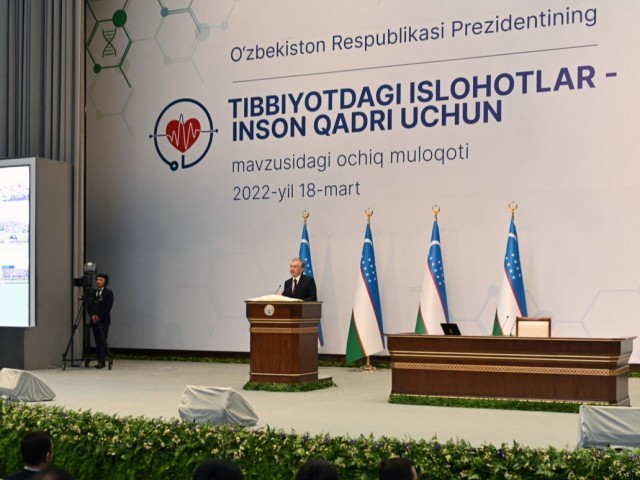Uzbekistan President declares over 10 news items for medical students
Local
−
18 March 2022 10043 4 minutes
Today, in Uzbekistan, there is a shortage of about 8,000 medical specialists, as well as more than 3,000 family doctors at the primary level in medical institutions. The need for doctors is particularly high in Surkhandarya (2,000), Tashkent (1,500), Kashkadarya, Fergana regions and Tashkent city (1,000). The President of Uzbekistan Shavkat Mirziyoyev reported this in an open conversation with the medical staff.
The Head of State noted that 45% of system doctors and 40% of nursing staff do not have a qualification category. Only 25 percent of doctors receive medical training.
In order to remedy the situation, a new system will be introduced to provide health facilities with qualified personnel.
For this purpose, from the academic year 2022-2023:
- quotas for admission to medical universities on the basis of State grants will be increased on the basis of the real need for doctors in the regions;
- state grants for master’s degree in 15 narrow fields, such as physiology, hematology, nephrology, pulmonology, psychiatry, emergency care, laboratory work, infectious diseases, will be quadrupled;
- a six-month specialized course will be organized in 11 medical universities, and a targeted training program for more than 500 family doctors will be held annually in the most important narrow specialties in the regions.
The system of bachelors, masters and clinical ordinate will also be improved.
In particular:
- the qualification requirements for graduates will be reviewed in the main areas of demand;
- curricula and programs, the system of assessment of students' knowledge will be brought in line with international standards;
- eleven medical universities will have separate training centers equipped with modern simulators. 250 billion som will be allocated for this purpose.
In addition, medical students in bachelors of grade 5-6 and masters students of medical institutions are admitted to work as doctors in the primary and emergency medical care system.
This will allow about 7,000 students to earn a decent salary each year and combine their studies with internships.
Students who decide to change course during the internship will be allowed to continue their studies in other related fields.
«At the same time, we will pay special attention to the training of modern medical managers with a deep understanding of advanced medicine, good knowledge of information technologies and foreign languages and good managerial skills», – the President said.
Another important issue is that the system of advanced training in the field of medicine will be entirely changed on the basis of completely new approaches, involving leading foreign specialists.
At the same time, 11 medical universities will organize faculties of advanced training and retraining, and in 23 specialized centers – courses of special training.
In addition, large and prestigious private hospitals will have clinical facilities at medical universities, enabling them to upgrade and retrain doctors and nurses.
With this connection, the activities of the national centers for the further training of medical personnel will be completely reviewed.
These organizations are now engaged only in the development and implementation of modern methodologies.
At the same time, the terms of obtaining the qualification category of doctors will be revised. The required length of service for non-categoric workers will be reduced from 5 to 3 years, for the first category from 7 to 5 years, and for the senior category from 10 to 7 years.
“In fact, when we think about nurses, we think about those medical professionals who only know how to administer injections. However, in developed countries, the knowledge, skills, and responsibility of nurses are no less than that of doctors. In our case, the responsibility lies with the doctors. Therefore, the system lacks doctors.
The number of paramedics is higher than necessary, which means the quantity is high and the quality of services is low», – the President said.It was noted that in the current year 20,000 young people would graduate in medical colleges and technical schools, and in 2023 that number will rise to 34,000. However, the average need for secondary medical staff in the industry is only 10,000 per year.
Live
All
